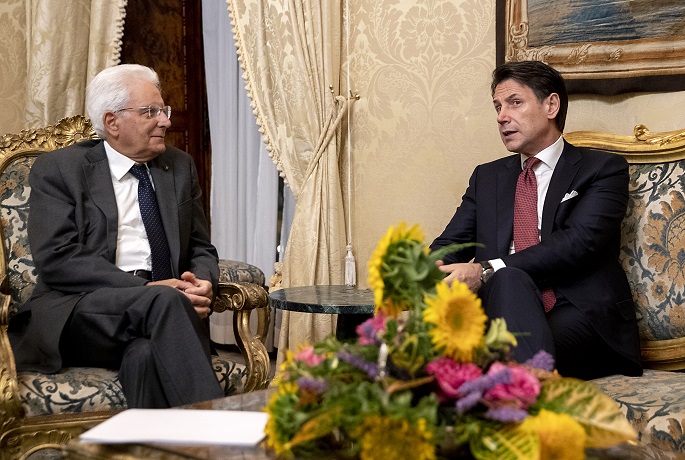Italy's PM resigns amid political row
Published : 20 Aug 2019, 21:32
Updated : 21 Aug 2019, 02:39

Italian Prime Minister Giuseppe Conte on Tuesday remitted his mandate in the hands of the president, officially putting an end to his populist government after only 14 months in office, and, opening the way to a phase of political talks among parties.
The announcement came from President Sergio Mattarella's office, following a tense political day in which Conte addressed the senate, anticipating his intention to resign.
"President Sergio Mattarella has received Giuseppe Conte, who has submitted the resignation of his government," the president's office said in a statement.
After accepting the resignation, Mattarella asked Conte to remain in office to take care of current affairs.
NEXT STEPS
Consultations will start on Wednesday at 4 p.m. local time, and end on Thursday at 5 p.m., the president's office also stated.
They will be led by Mattarella, whose role in this phase is to verify with all political forces in parliament whether another majority is possible in order to form a new government.
He might also suggest forming a technocrat cabinet acting as caretaker in the next months for the most urgent needs -- such as the approval of the country's next budget -- if political parties agree.
If none of these options proved viable, the president will have to dissolve the parliament, and call snap elections, as early as in October.
CRITICISM TO HARD-LINE SALVINI
The resignation of Giuseppe Conte -- a 55-year-old mild-mannered lawyer -- was the direct result of growing tensions between the two parties in the coalition cabinet, anti-immigrant League and anti-establishment Five Star Movement (M5S).
Conte, a political independent, does not belong to either of them.
The crisis was triggered by the League leader and Interior Minister Matteo Salvini, who on Aug. 8 publicly declared the governing majority no longer existed, and it was time to "go back to voters".
Soon after that, Salvini submitted a no-confidence motion in parliament against his prime minister, claiming the cabinet's action was not longer effective due to obstructionism of the M5S.
Addressing the senate earlier in the afternoon, Conte harshly criticized this decision, and accused Salvini of making irresponsible choices for personal and political reasons.
"This has been an objectively grave decision, which entails serious consequences for the country's political and economic life," Conte told senators.
"Calling citizens to vote is the essence of democracy, but asking them to vote every year is irresponsible," Conte also stressed.
Speaking amid his cabinet ministers, with Salvini sitting hard-faced on his right, Conte accused the League leader to have been looking for a pretext to go back to polls since after scoring a wide victory in European parliament elections in May.
In that vote, the League doubled its support from around 17 percent in 2018 national elections to over 34 percent, while his coalition partner, the M5S, almost halve its consensus.
Salvini replied immediately after the prime minister, saying he did not regret anything he did lately.
He explained his decision to pull the plug on the government was due to his coalition partner -- the M5S -- saying too many "no", for example by opposing the prosecution of the high-speed rail project (TAV) between Turin and Lyon.
POLITICAL OPTIONS
While addressing the senate, Salvini stressed his party was not afraid of fresh elections.
Yet, surprisingly, he added that the League would still be available to approve a proposed cut of members of parliament -- a key proposal of the M5S -- before going to the polls again.
The proposal was not accepted by the anti-establishment movement, which is led by Economic Development Minister Luigi Di Maio.
Domestic analysts and media reports suggested that a possible dialogue could now open up between the M5S and center-left Democratic Party.
Another possible option for a new majority would be for the League to ally with former premier Silvio Berlusconi's center-right Forza Italia and far-right Brothers of Italy party.

